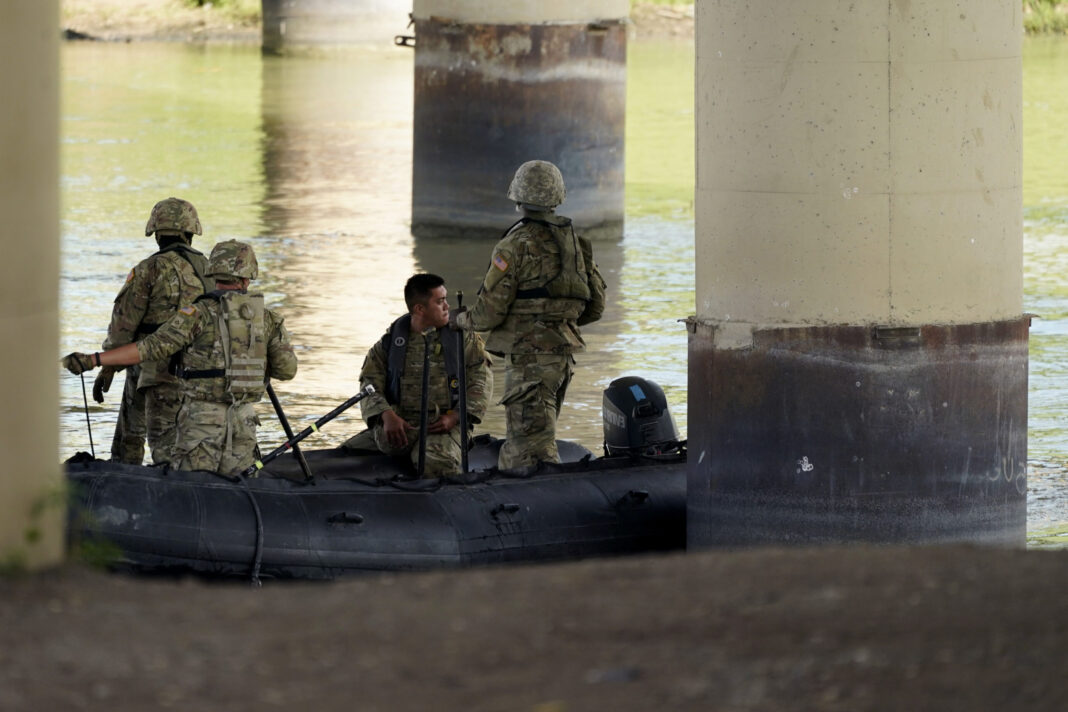Eagle Pass, Texas — The Rio Grande flows steadily, cutting across the land as it has for generations, but today, its shores tell a different story. Men, women, and children, weary and hopeful, arrive only to be met with violence they did not expect. Human Rights Watch has accused the Texas National Guard of repeatedly firing pepper spray projectiles at these migrants, people whose only wish is to cross into the safety of a new world.
The reports, troubling in both their nature and scope, come from multiple eyewitnesses. These are not the voices of politicians or generals, but everyday people—mothers, fathers, neighbors—who watched, helpless, as the cries of those crossing the border echoed across the water. Among them was Josie Rodrigues, an Eagle Pass resident. Her voice, like the gentle breeze that whispers through these borderlands, trembles as she recounts the scene.
“I saw him—right there, by the wire,” she said, her hand shaking as she pointed. “He did nothing wrong, nothing to deserve what they did to him. The Guard aimed their weapon straight at him. Not around him. Not to his feet. Four or five times, they shot those balls of gas. I saw him fall.”
The man never rose again.
A Grim Reality Along the Border
Human Rights Watch, in its poignant call to action, has asked the Texas legislature to reconsider the funds allocated to the state’s military department. They question how such brutality could occur under the watchful eyes of those tasked with protecting and serving. Bob Libal, a consultant for the organization, shared the heartbreaking details of recent events.
“In separate incidents this summer, witnesses reported seeing the Texas National Guard use pepper spray projectiles on migrants, people who posed no threat,” Libal explained. Among the victims were children—young souls with eyes filled not with fear or malice, but with dreams of something better. “These are human beings,” Libal reminded us. And yet, their humanity seems to have been forgotten in the harsh glare of the border’s spotlight.
The pepper spray projectiles, as described by the organization, are not just harmless deterrents. Encased in hard, ball-like shells, they release their stinging irritants with force, impacting the skin, eyes, and lungs of those they strike. Migrants, already exhausted from their treacherous journey, find themselves gasping for breath, their bodies wracked with pain.
The Border as Witness
On the seventh day of September, as the sun burned hot overhead, three witnesses stood on the Mexican side of the border in Piedras Negras. They watched in horror as a lone migrant, having crossed the Rio Grande and reached the American side, found himself caught in the barbed wire along the water’s edge. He did not shout. He did not threaten. He merely stood, his body a testament to survival. And yet, from the distance came the sharp sounds of pepper spray guns.
They tried, desperately, to call for help—911, the lifeline of so many in danger—but their voices, calling from Mexico, were left unheard. The man, his dreams tied to this moment, crumpled under the force of the gas, his body unmoving as the National Guard looked on.
Human Rights Watch Speaks Out
Human Rights Watch’s demand is clear: stop the violence, stop the unnecessary use of force. Let this land be a place of safety, not fear. According to the organization, the use of force should only be proportional to the situation, and in these cases, the actions of the Texas National Guard cannot be justified.
Even General Thomas Suelzer, adjutant general of the Texas Military Department, testified before the Texas Senate’s Border Security Committee in June, saying that the use of force by his department must remain limited. It is for self-defense, he said, and must always be “the minimum level necessary.” But what self-defense can there be in the face of a man who simply stood, unmoving, beside a river that has seen so much?
The Children at the Border
One incident stands out among the rest, a stark reminder that no one, not even the youngest, is safe from the hands of those sworn to protect. On August 5th, a group of migrants—many of them children—found themselves under fire from these pepper spray projectiles. The children’s eyes burned, their tiny bodies writhing in discomfort as they struggled to understand why this was happening to them.
The Border Patrol, quick to respond to the accusations, denied involvement. The Texas National Guard, they said, was in control of the area that day. But the question remains: who will be held accountable?
A Call for Compassion
As the sun sets over the Texas border, casting its golden light over the fields and rivers, one cannot help but wonder—what happened to the land of the free, the home of the brave? In Maya Angelou’s voice, we remember that we are more than the lines drawn on a map, more than the laws that divide us. “We are more alike, my friends, than we are unalike.”
For now, the pepper spray lingers in the air, a harsh reminder that compassion is needed more than ever. Human Rights Watch continues to urge the Texas legislature to reconsider its funding for military actions at the border. They remind us that no wall, no barrier, can keep out the truth that we are all, in the end, human.


